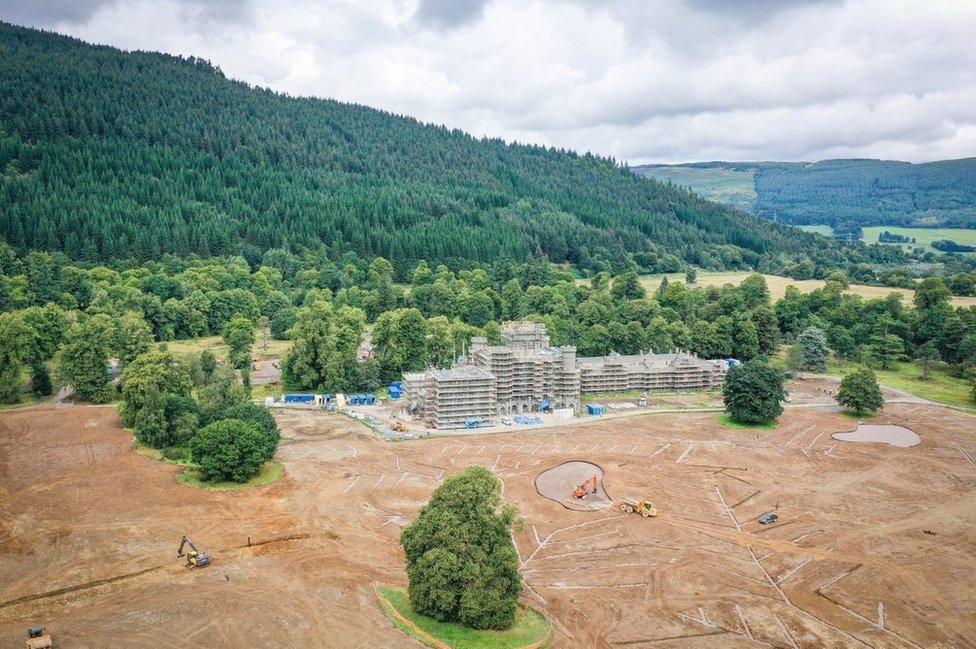Taymouth Castle: Row over £300m redevelopment shatters peace
- Published
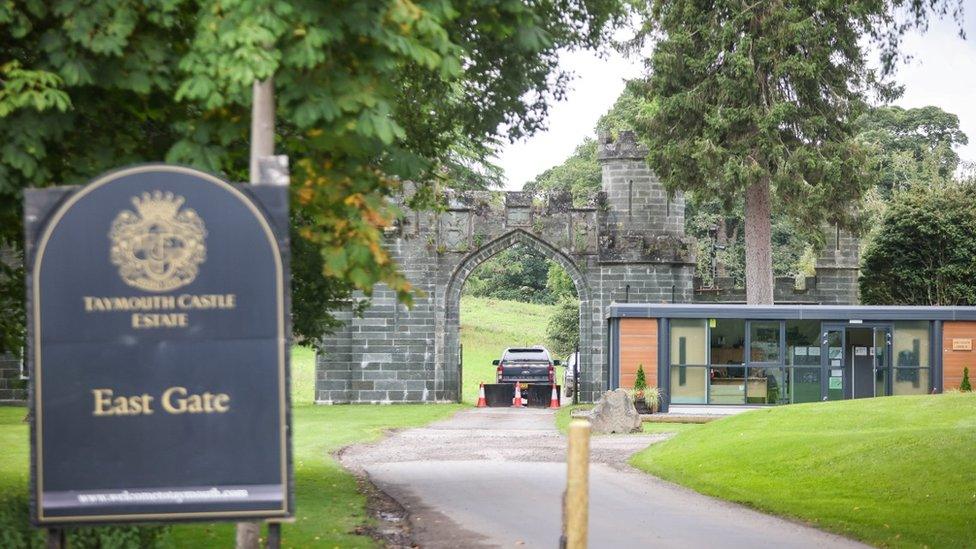
Access to parts of the estate are limited due to construction work on the project
The Perthshire village of Kenmore is a tranquil tourist destination at the northern end of Loch Tay which is home to a few hundred people.
But the peace has been shattered by a row over the £300m redevelopment of nearby Taymouth Castle by American real estate firm Discovery Land Company (DLC).
A protest group has been campaigning against the proposals for the 450-acre Perthshire estate - but the local community council say local residents are largely in favour of the plans.
DLC's website says those proposals include the restoration of the castle and golf course, building 167 new homes, and landscaping park and woodlands.
The castle dates from 1842. Planning permission to renovate it and build hundreds of homes on the estate was granted between 2005 and 2011, with various developers coming and going in the meantime.
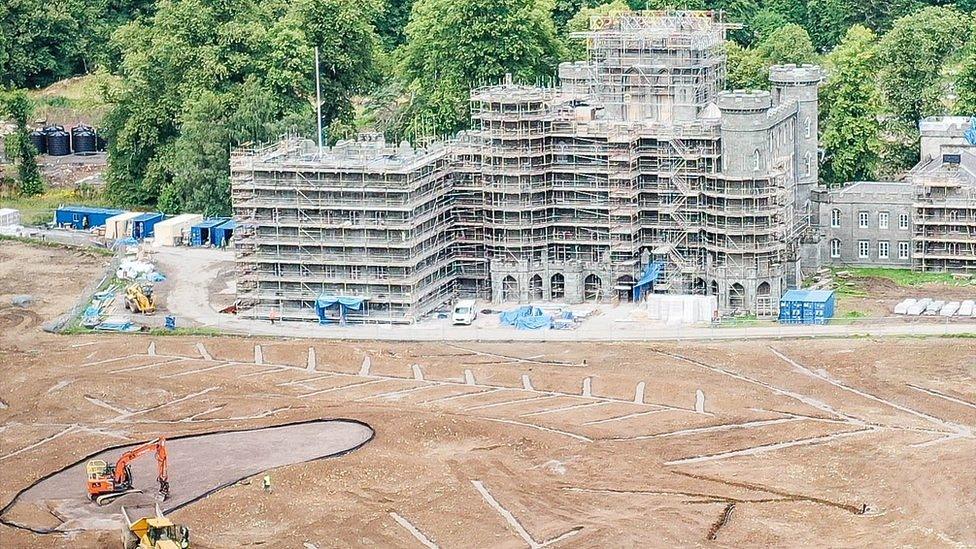
Taymouth Castle and the surrounding estate are undergoing a £300m redevelopment
DLC bought the castle in 2018 and since then has been buying nearby land and businesses.
These include the Kenmore Hotel and the village shop, which are both currently being renovated, as well as cottages earmarked for estate staff.
But DLC's other international developments, which they call "worlds", are causing concern for the protest group, Protect Loch Tay.
These "worlds" are exclusive affairs in places like Dubai, the Hamptons in New York, and Barbuda in the West Indies.
DLC describes them as "private residential club communities," but is emphatic Taymouth will not be a gated community.
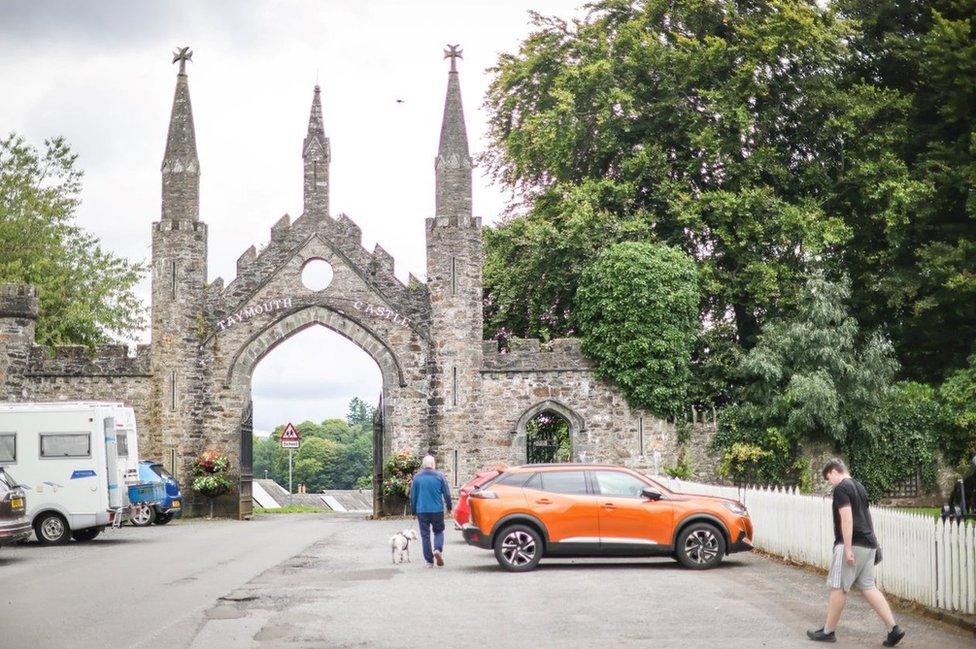
DLC bought the castle in 2018 and have been buying nearby land and businesses since then
However, Protect Loch Tay fears that the developer is creating a private resort for millionaires that won't benefit the wider community.
They are also concerned over access rights and the local environment.
Rob Jamieson, from the protest group, said: "Gates don't have to be physical. It can be gated purely by pricing everybody out of the place."
The group say individual planning applications submitted by DLC are being "drip-fed to the community" and this is "neither fair nor ethical".
But Kenmore and District Community Council say locals are largely in favour of both the development and DLC's purchase of a number of businesses and properties in the village.
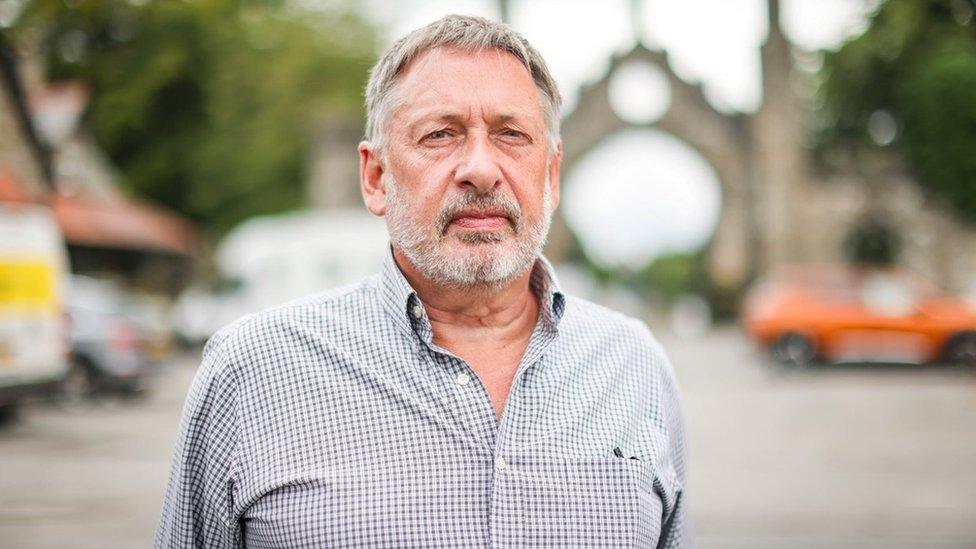
Colin Morton said there was widespread local support for the development
Protect Loch Tay's petition calling for a halt to further and future development has attracted almost 150,000 signatures - but Colin Morton from the local community council is sceptical.
He said: "On the electoral roll for our little community here there are only 200 adults. So where are all these people coming from?
"The petition people tell us they have supporters from all around the world.
"I'm not sure why they feel that they're qualified to tell us how to manage our community."
Protect Loch Tay said the majority of signatures were from people in Scotland, and that they had been contacted by Kenmore residents opposed to the development.

Protect Loch Tay said the majority of people signing their petition were from Scotland
The group's organisers do not want to be pictured after receiving online abuse.
Mr Jamieson said: "We'd like it (the redevelopment) to be stopped where it is just now until it gets looked at properly, and there's a full plan and everybody can see what their intentions are.
"We all move forward knowing what's going on and people can object then to things once they see them."
The row escalated earlier this month, with the community council telling the protest group to "step back and leave it alone".
The community council said the group was misinformed and unrepresentative of the wishes of local people, and accused it of "misinformation and scaremongering".
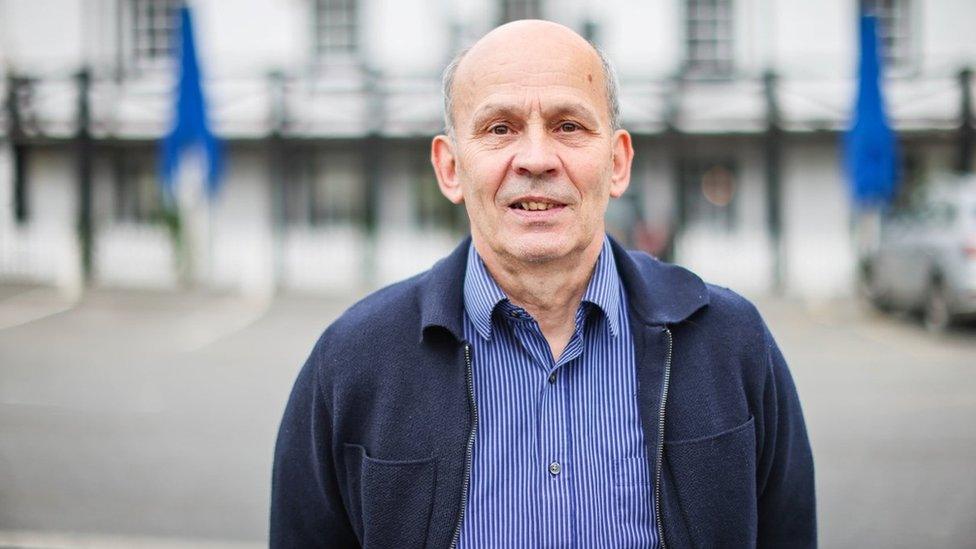
Keith Mitchell from the Kenmore Bakery is one of those backing the project
Keith Mitchell, who runs the Kenmore Bakery and backs the development said: "If someone is prepared to spend so much of their money, it's up to them to do what they want, within the bounds of local regulations and national regulations.
"They should be allowed to get on and do the job for the benefit of their business and our community."
He said he had no issue with the purchases of local properties, citing a tradition of estate staff being based in the village.
"Everything in this area centred round the castle. The gardens where the Kenmore Club is now, that used to employ a vast amount of men.
"The Mains of Taymouth used to be the dairy and the gasworks, it was all geared round the castle," he said.
Mr Jamieson said that buying up properties and making them available for staff could be a good thing in itself.
"That would be fair enough. I think what they're actually trying to do is, they're creating a dormitory of Kenmore for their staff," he added.
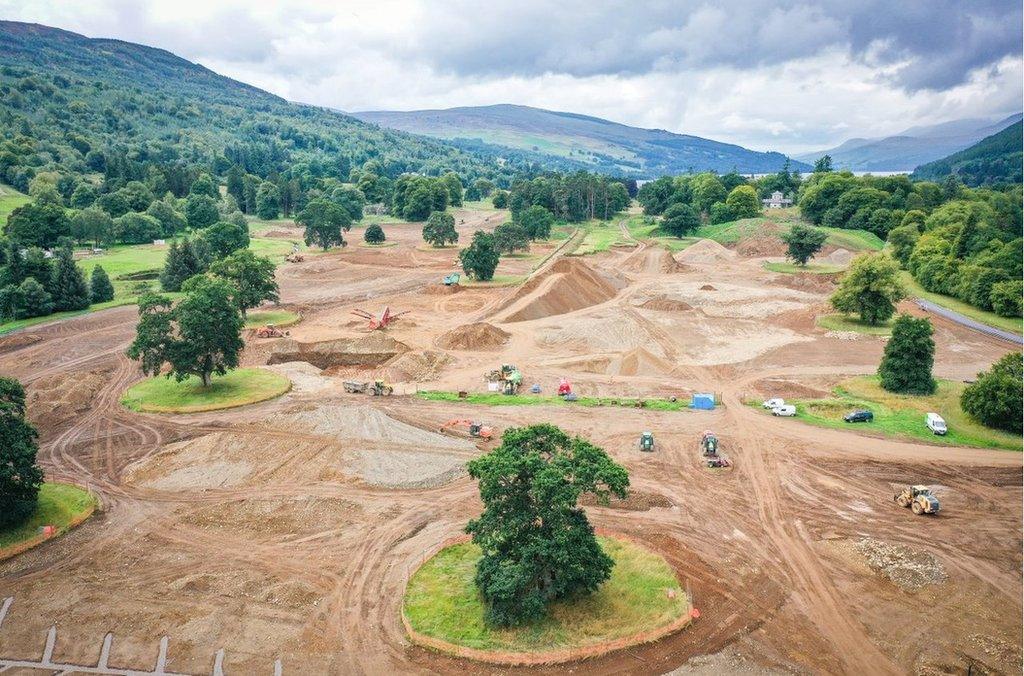
The scale of the £300m development can be seen from the air
Hundreds of people recently attended a public meeting called in nearby Aberfeldy by local politicians over the development.
Issues raised included the potential impact on wildlife, difficulties understanding the extensive planning applications, how exclusive the estate will be, and fishing access on Loch Tay.
Those backing the project said not enough was being done to highlight its economic and employment benefits.
Protect Loch Tay have submitted 15 requests to DLC, including a report on the social and economic impact of the development and a commitment to "fully honour all access throughout the entire Taymouth Estate".
Colin Morton, from the community council, said there was considerable oversight for the development from organisations like Forestry Scotland; the Scottish Environment Protection Agency on water quality and environment issues; Perth and Kinross Council on planning; and the Scottish government on "the bigger picture".
"That's democracy at work," he added.
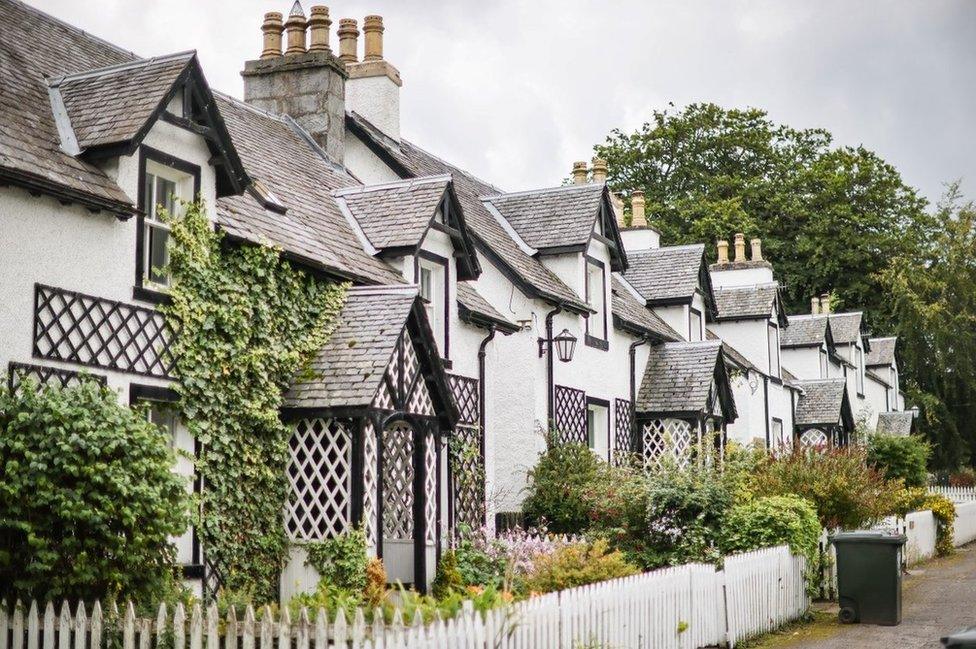
DLC have also purchased a number of properties in the village
DLC declined to comment or put anyone forward for interview despite repeated requests from BBC Scotland.
The company said it had published a question and answer section about the development on its website.
But, David O'Donoghue the castle's new general manager, has replied to a letter from local SNP politicians John Swinney and Pete Wishart, who are seeking clarity on the company's plans.
Mr O'Donoghue said the firm "hopes to earn the privilege to be considered by you as good neighbours".
He said the company would fully comply with all legislative requirements, "particularly with regard to public access".
"We are 100% committed to not just working in harmony with the environment, infrastructure, businesses and way of life, but wherever possible to enhance them - and do so in a way that respects the land, people and traditions," he added.
